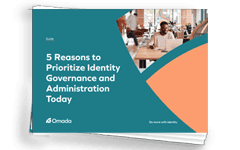Omada is at the forefront of Identity Governance and Administration, providing organizations with the tools they need to manage identities, control access, and ensure compliance. Our IGA leadership has been recognized in the 2024 KuppingerCole Leadership Compass for Identity and Access Governance, highlighting our commitment to innovation, security, and customer satisfaction.
The following excerpt for Omada has been taken directly from the 2024 KuppingerCole Leadership Compass for Identity and Access Governance:
About Omada
Omada provides Omada Identity as an on-premises solution and Omada Identity Cloud for customers wanting a cloud-native SaaS solution. Both solutions deliver a full range of IGA functionalities with feature parity between the delivery models. The accelerator package allows customers to be operational within 12 weeks. Omada components include an enterprise server portal and services for provisioning, data warehouse, and role and policy engine.
Omada Strengths Highlighted:
- New cloud native, multitenant and zero trust architecture-based horizons platform delivers all IGA related capabilities.
- AI and machine learning implemented for various tasks such as role discovery, access recommendations, analysis of access management data.
- Unique configurable connector community.
- Supports all capabilities related to identity lifecycle management including transfer of identity.
- Interactive AI assistant designed for product documentation, capable of responding with product details in the user’s chosen language.
- Omada compliance workbench provides unified view of compliance state of all access rights across all systems.
- Reporting model uses advanced analytics.
- Supports all deployment models.
Omada Identity Cloud
Omada has released its next generation of Omada Identity Cloud service with a completely cloud-native platform. This platform is the basis for delivering all future features to Omada’s customers. This update modernizes data ingestion with focus on real-time data processing and streaming data. The platform is multitenant compute and uses zero-trust architecture which is fully based on exposed APIs. The integration capabilities of this platform allow consumption of the data in both ways.
Customer Portal
Omada has a customer portal called the Omada Hub which provides documentation, tutorials, videos and a forum for questions and answers. Omada supports JavaScript and .NET programming languages directly and all other modern programming languages can easily be supported by this language support. The solution supports access review for all identities including external identities.
Connectivity & Integrations
Omada Identity Cloud Platform supports a wide range of out-of-the-box and configurable connectors for SaaS systems, but support for certain legacy on-premises systems is limited. Omada provides a connector community for peers to share, generate and install connectivity packages that are easy to deploy. Omada exposes capabilities via SOAP, REST, SQL, OData and GraphQL APIs. These APIs are used for integration with third-party tools, integration with data in the solution, and managing the cloud platform by itself.
Omada has a GraphQL API for integration with third-party applications such as ServiceNow. With the introduction of this GraphQL API, it is now possible to support chatbot interfaces. Customers can integrate with Omada to perform access requests via GraphQL APIs through third-party applications, such as chatbots.
AI & ML for Intelligent Decision Making and Automation
Omada supports AI analysis of user access management data. Omada’s enhanced role mining uses machine learning to provide role suggestions. Omada has also introduced an AI assistant that will help users at decision points using natural language processing. This will include analysis of user access management data. The solution supports continuous validation of access policies, closed-loop reconciliation, automatic case management and context modeling.
Omada’s peer access analysis and peer recommendations provide rule-based automation to recommend access and highlight outliers. The role mining engine, which is called Omada Role Insights, is cloud native and supports role analytics and role discovery. The solution uses advanced machine learning algorithms for role discovery. Analytical dashboards show the results of the role discovery and allows the user to see how resources are related to roles and identify patterns. Omada also provides bottom-up role discovery where if a user has all the characteristics of a role, then the role is implicitly assigned. The solution uses AI for recommending access requests based on peers via a thorough analysis.
Modern UX
Omada Identity’s user interface is modern and user-friendly with good features for user selfservice, including the Omada Identity Cloud Management Portal. The portal enables SaaS customers to fully manage the back end of the solution including performing upgrades, creating, and editing environments, and more, without requiring assistance from Omada support. The solution supports a wide range of authenticators including passwordless authentication for users and admins. Omada offers good user interface for self-service for access request, delegate access from tablets and mobile phones.
Product Roadmap
Omada is focused on enterprise-sector customers in North America and EMEA. Their 2024 roadmap includes a new reporting platform that provides Identity analytics that powers enhanced dashboards and role discovery, both delivered in regular update intervals in the cloud, a collaborative role discovery tool for managers and other leaders for creating roles for their populations is also planned in the roadmap.
Being named an overall leader in this report demonstrates Omada’s excellence and forward-thinking approach to identity and access governance.



























